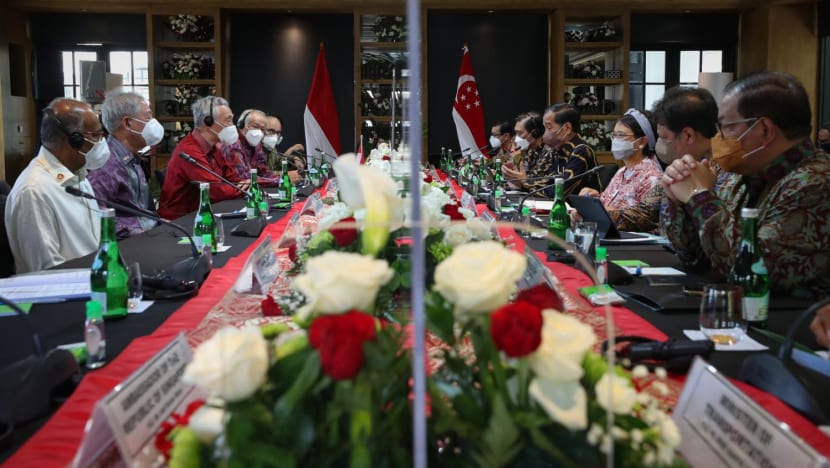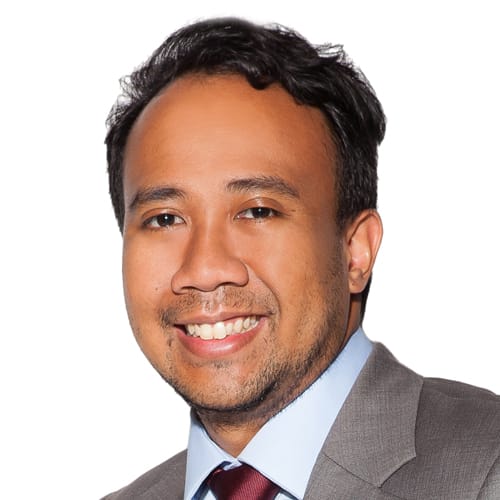Singapore and Indonesia have signed a ‘balanced’ set of agreements that addresses 3 longstanding issues: PM Lee
BINTAN: Singapore and Indonesia have signed a “balanced” set of agreements that addresses the “longstanding” bilateral issues of Flight Information Region (FIR), defence cooperation and extradition of fugitives, Prime Minister Lee Hsien Loong said on Tuesday (Jan 25).
Speaking during a joint press conference with Indonesian President Joko Widodo at the 5th Singapore-Indonesia Leader’s Retreat, Mr Lee said these three issues are important to both sides.
“They have been on our bilateral agenda for several decades. We have worked together and discussed them many times before,” Mr Lee said.
The two leaders had earlier witnessed the signing of the agreements at the Sanchaya resort in Bintan.
Mr Lee said that at the previous Leaders’ Retreat in October 2019, Mr Widodo and he had decided that “it was time to decisively settle these longstanding bilateral issues”.
“We endorsed a framework which would address the needs and interests of both sides", Mr Lee said, adding that Indonesia’s Coordinating Minister for Maritime Affairs and Investments Luhut Pandjaitan and Senior Minister and Coordinating Minister for National Security Teo Chee Hean were tasked to follow up with detailed negotiations
“The conclusion of these agreements demonstrates the strength and maturity of Singapore-Indonesia relations,” Mr Lee said.
“These agreements take into account both parties’ interests, represent a good balance of benefits, and are durable agreements for the long haul, designed to last for at least a generation.”
The agreements also create a “solid foundation” for the countries to move bilateral relations forward with confidence, Mr Lee added.

REALIGNMENT OF FLIGHT INFORMATION REGIONS
Under the agreement on airspace management, Singapore and Indonesia have agreed to realign the boundary between Jakarta Flight Information Region (FIR) and Singapore FIR.
Indonesia will delegate to Singapore the provision of air navigation services in portions of the airspace within the realigned Jakarta FIR. This agreement will remain in force for 25 years and can be extended by mutual consent.
During the joint press conference on Tuesday, Mr Lee said: “The FIR Agreement will meet the civil aviation needs of both countries, and uphold the safety and efficiency of air traffic in a manner consistent with ICAO (International Civil Aviation Organization) rules.”
Indonesia has repeatedly expressed its wish to take over control of the FIR above Riau islands, which has been managed by Singapore since 1946 as mandated by ICAO.
Singapore has repeatedly said that the FIR is not an issue of sovereignty, but of the safety and efficiency of commercial air traffic.
DEFENCE COOPERATION AGREEMENT AND EXTRADITION TREATY
Under the Defence Cooperation Agreement, Singapore and Indonesia will continue to strengthen defence partnerships and deepen cooperation in mutually beneficial areas. The agreement will be in force for 25 years.
Commenting on the Defence Cooperation Agreement, Mr Lee said this will strengthen cooperation between the armed forces of Singapore and Indonesia, and advance the countries’ defence relations.
He added: “The Extradition Treaty will enhance cooperation in combating crime and send a clear positive signal to investors.”
Under the Extradition Treaty, Singapore and Indonesia will grant extradition for a comprehensive list of extraditable offences covered by the treaty.
The treaty adds to Singapore's extradition arrangements with jurisdictions across the globe, including Commonwealth jurisdictions such as the United Kingdom, as well as reciprocal arrangements with Malaysia and Brunei Darussalam.
Singapore and Indonesia had earlier signed an Extradition Treaty and Defence Cooperation Agreement as a package in April 2007, witnessed by Mr Lee and then-president of Indonesia Susilo Bambang Yudhoyono.
However, both agreements have yet to be ratified by Indonesia’s House of Representatives.
Mr Lee said on Tuesday that the countries have exchanged letters to agree that the latest three agreements will enter into force simultaneously. “What remains will be for both countries to complete our domestic processes to ratify and bring the set of agreements into force,” he said.
He thanked Mr Widodo for bringing about a “very positive outcome” through his leadership and vision, and officials on both sides for “their tireless work and their shared determination to make progress on these longstanding bilateral issues”.
“I encourage the ministers and officials to maintain close cooperation and coordination and implement the agreements expeditiously,” he added.
CROSS-BORDER TRAVEL
Mr Lee also said during the press conference that he has discussed with Mr Widodo the resumption of cross-border travel, noting that Indonesia has resumed tourism travel from Singapore to Bintan and Batam.
"It implemented a travel bubble to Bintan and Batam, and Singapore will discuss with Indonesia how we can make this bi-directional, and we hope without taking too long," he said.
Mr Lee said he and Mr Widodo agreed to continue discussions to expand air and sea travel to more destinations in Indonesia.
“But we have to take into account the COVID situation, and in particular the outbreak of the Omicron variant, and we will do so at a pace that both sides are comfortable with, taking into account our respective public health situations,” Mr Lee said.
BILATERAL COOPERATION
Mr Lee said he and Mr Widodo also reviewed the countries’ ongoing bilateral cooperation, pointing out that the countries are strengthening institutional linkages to deepen financial cooperation.
Singapore and Indonesia are also exploring new areas of collaboration, such as sustainability, the green economy, digital economy and human capital development, he continued.
“Singapore has consistently been Indonesia’s top foreign investor since 2014, and despite the pandemic our investments have grown,” Mr Lee said.
Both countries also signed several other bilateral agreements on Tuesday.
The finance ministries of Singapore and Indonesia signed a Memorandum of Understanding (MOU) on financial and economic cooperation.
The MOU covers traditional collaborative areas like customs cooperation and fiscal policies, as well as emerging areas like financial services, climate finance and the digital economy.
The central banks of both countries have also signed an MOU to strengthen bilateral cooperation and deepen ties.
The MOU promotes collaboration on projects related to payments innovation, and formalises cooperation across an expanded range of central bank and regulatory functions, the Monetary Authority of Singapore and Bank Indonesia said.
Singapore’s Ministry of Sustainability and the Environment (MSE) and Indonesia’s Ministry of National Development also signed an MOU on partnering in green and circular economy development.
Potential areas of collaboration include resource optimisation and recycling initiatives to address electronic, food and packaging waste including plastics.
Both countries have also signed an MOU on energy cooperation to further energy transition in both countries and the region.
Additionally, Singapore’s Ministry of Education (MOE) and Indonesia’s Ministry of Education, Culture, Research and Technology have signed a Human Capital Partnership Arrangement (HCPA) to deepen educational cooperation and links between the countries’ education fraternities and students.
“The HCPA will also expand opportunities for Singaporean and Indonesian students to participate in overseas exchanges and internships, so as to deepen their understanding of each other’s countries and prepare them to better engage with the region, MOE said in a factsheet.
REGIONAL ISSUES
On regional issues, Mr Lee said he discussed with Mr Widodo the issue of Myanmar, where the situation “remains serious”.
Both leaders noted that no significant progress has been made implementing the Association of Southeast Asian Nations’ (ASEAN) five-point consensus since its adoption in April last year, as they urged for progress in the delivery of humanitarian assistance.
“We are committed to help Myanmar reach a durable and peaceful resolution in the interests of its people,” Mr Lee said. “But it is essential for the ASEAN chair and his special envoy to engage all parties involved.”
Mr Lee said Singapore will continue to work with ASEAN chair Cambodia, the next chair Indonesia, and other ASEAN member states on the full implementation of the five-point consensus and other relevant ASEAN decisions.
Mr Lee also thanked the Indonesian leader for inviting Singapore to this year’s G20 meeting. “We look forward to supporting Indonesia’s G20 chairmanship and making it a success.”
Finally, Mr Lee said the retreat on Tuesday shows that the bilateral relationship between Singapore and Indonesia is in “good working order”.
“Our two countries are able to work together in challenging circumstances, and resolve longstanding issues in an open and constructive manner,” he said.
“I am confident that we will build on these strong foundations and develop new areas of collaborations to benefit future generations.”
















